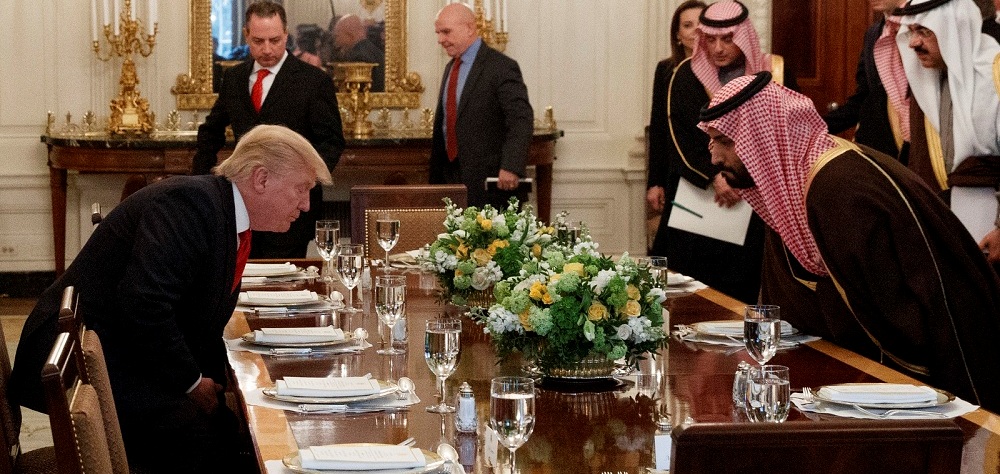Alwaght- Saudi Arabia’s regional policy has fundamentally transformed under King Salman bin Abdulaziz and his son Prince Mohammed who is now the center of a policymaking orbit in the absolute monarchy. Riyadh engaged in military adventures in the region, involved in the crisis of the war-ravaged nations like Iraq, Syria, Libya, and Afghanistan, and embarked on a hostile policy against the Axis of Resistance camp’s members including Iran and Lebanon’s Hezbollah. Saudi policy shift is brazenly obvious in the regime's stance towards Palestinian issue.
Saudi Arabia has abandoned its shallow support for the Palestinian people and has become the enforcer of a US scheme to terminate the Palestinian cause. This is, in fact, a long-term Israeli end that found no chance of rise until Donald Trump became the president of the US and rose high to the administration’s agenda. Trump administration gave the Saudi rulers a mission to build the ground for doing the job in the Arab world. The main pawn for the American game is naïve and ambitious Prince Mohammed bin Salman who has gained power to sway the Al Saud ruling family in a short time.
Spotting such substantial rivals as his cousin Mohammad bin Nayef in the road to the ascension of the throne, Prince Mohammed showed his readiness to the Americans to betray the Palestinian people and the Muslim world. In a time when not only the Palestinians and the Muslim public but also a majority of the international community blasted the Trump move to recognize al-Quds (Jerusalem) as the Israeli capital and relocate the US embassy to the occupied city, bin Salman traveled to the US and in a closed-door meeting addressed the heads of Jewish organizations with surprising words. He asserted that the time has come for the Palestinians to accept the Trump’s proposal for talks and sit on the negotiating table or “shut up” and stop complaining. The king-in-waiting has told the pro-Israeli audience that Palestine was not a top priority to the oil-wealthy monarchy.
In the meantime, the Reuters news agency reported on July 29, citing senior Arab diplomat in Riyadh, that “in Saudi Arabia, the king is the one who decides on this issue now, not the crown prince”. The reassurance comes to address concerns raised by some Arab states who are afraid the kingdom could change its stance on Palestine under the sway of the powerful son of the king. The Palestinian ambassador to Riyadh Basem al-Agha told Reuters that King Salman had expressed support for Palestinians in a recent meeting with President Mahmoud Abbas of the Palestinian Authority, saying: “We will not abandon you … We accept what you accept and we reject what you reject.”
The new Saudi posture can be viewed from two aspects:
Palestinian unity forcing Riyadh back
In 1979, Egypt sealed a peace and recognition deal with the Israeli regime. Jordan also followed suit in 1994. The Arab compromises ushered in a period of division between the Palestinians. While the Palestinian Authority favored dialogue with the occupying regime of Israel, other factions argued that under Tel Aviv's expansionism, peace made no sense and did not realize Palestinian people’s dreams for taking back their territories. They also were divided on how to deal with the US role in this process.
However, things changed under the new conditions. The US and the Israeli regime relatively unveiled the plot to fully seize the Palestinian territories and show no commitment even to a minimum level of Palestinian interests, ostensibly guaranteed during the past negotiations. Now the Palestinians are unifying their voice in rejection of occupation and return to the choice of resistance. Meanwhile, they label traitorous and “enemy to Palestine and Muslim world” any parties who side with the Trump conspiracy. Nineteen weeks into the moving the embassy, the Palestinians still rallying for their right to return and making their voice heard globally under “Great March of Return” campaign, though being directly targeted by the Israeli forces and snipers who so far killed at least 154 protestors and wounded thousands.
Meanwhile, the inexperienced bin Salman, who calculated that Palestine occupation was no longer a top cause for the Muslims under the shadow of the crises that rocked the Arab world following the uprisings of 2011, decided to play to the hands of the US. Cooperating with Americans in Palestinian cause delivered a blow to the kingdom's already-fading credit among the Muslims and boosted the rival Muslim discourse, which favors resistance against the Israeli regime's violations. Over the past years, Saudis have spent immense money and resources to block the fast-moving rise of pro-resistance discourse. Considering all these, King Salman has staged a show telling the Palestinians that Riyadh supports their cause, rejects the US plans, and that his son’s support to the Israeli expansionism is a personal position which will not continue.
Prince Mohammed and the US wrong game reading
Prince is increasingly turning out as a loser in different cases, including Syria, Qatar, and very importantly Yemen against which he has been fighting for four years. He is also facing home opposition by the rival royals, signaling that his political death is nearing.
This is a defeat to the White House game reading and proves that the Americans declined to accurately assess Prince Mohammed and even Riyadh’s capabilities to force other Arab and Muslim states and Palestinian to surrender to the US-sponsored “deal of the century”, a plan aimed to hammer the final nail in Palestine coffin. Washington now finds its maneuvering power shrinking amid Riyadh, and before that Egypt, backing down. The upcoming days will bear response to the questions about Trump’s next move to step out of the current impasse.



























